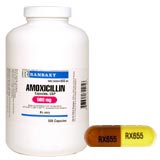How antibiotics are the best?
This issue is the cause of controversy currently. To prevent the development of resistance in bacteria, doctors often recommend taking antibiotics even if the symptoms have disappeared to prevent the bacteria from having a chance to revive.

Amoxicillin antibiotic (Photo: sitemaker.umich)
However, this rule does not seem to be suitable for all infections: using many antibiotics can also create resistance to bacteria.
The Dutch team led by Jan Prins confirmed that pneumonia could be cured within 3 days instead of 7 to 10 days. They followed the case of 129 patients hospitalized for mild pneumonia.
These patients were given intravenous amoxicillin antibiotics within 3 days. Half of them then continued their treatment with this pill in pill form, while the other half took placebo, all within 5 days. 8 days later, the cure rate (90%) was the same in all patients. This research was published in the British Medical Journal.
The effectiveness of short-term use of antibiotics has been demonstrated for some urinary infections in women or gonorrhea. On the contrary, for staphyloccocus, staphyloccocus should be used for a long time.
Therefore, to know the most effective treatment time, researchers need to carry out clinical trials for each infection. Anyway, the doctor is the one who decides the time to take the medicine.
- What are antibiotics and classify antibiotics
- 'Heavenly' facts about antibiotics
- Find new antibiotics under the ocean
- Why do you know that antibiotics do not treat flu, many people continue to abuse?
- Antibiotics from dirt
- Bad habits of parents hurt the liver and kidneys, endanger children
- 7 mistakes we often make when talking about antibiotics
- Understand disease to use antibiotics correctly
- Find a new drug that can replace antibiotics
- When do you need to say 'no' to antibiotics?
- Children under 2 years of age use many antibiotics prone to obesity
- The world is depleted of new generation antibiotics
 Green tea cleans teeth better than mouthwash?
Green tea cleans teeth better than mouthwash? Death kiss: This is why you should not let anyone kiss your baby's lips
Death kiss: This is why you should not let anyone kiss your baby's lips What is salmonellosis?
What is salmonellosis? Caution should be exercised when using aloe vera through eating and drinking
Caution should be exercised when using aloe vera through eating and drinking